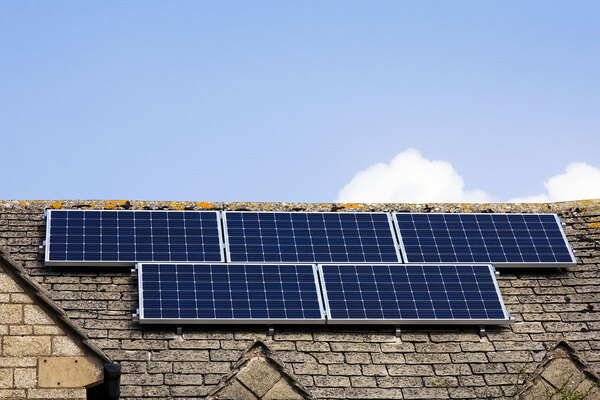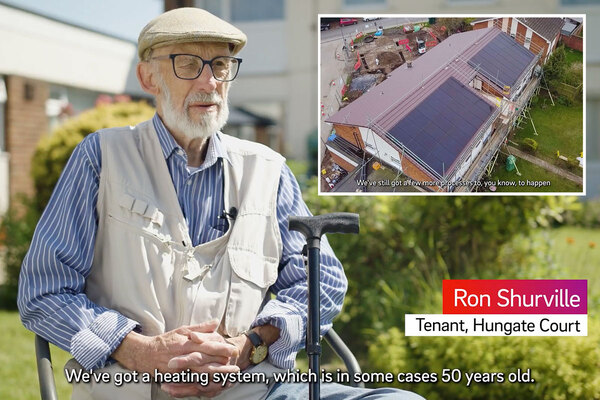Navigating the decarbonisation funding landscape
Many different funds are available to help providers decarbonise homes. Nick Huston of Daikin explains how landlords can make the most of energy-efficient products

In association with:
![]()
Which funds are available to help social housing providers decarbonise their housing stock?
There are too many to cover in detail, but I would mention the £500m Local Authority Delivery (LAD) scheme, which is targeted at local authorities but still very accessible to social housing providers. New applications close at the end of March 2022 and, at the moment, it is massively underspent.
Then there is the 10-year, £2.5bn Home Upgrade Grant (HUG) scheme, which can offer up to £25,000 worth of funding per home. This is focused on the installation of multiple energy-efficiency measures in off-gas properties and is mainly targeted at local authorities rather than social housing associations. But that will change as the different rounds progress, so it is a good one to be aware of.
Social landlords should know that their decarbonisation projects will not be fully funded – they will have to contribute around a third of the cost themselves. But greener solutions can still deliver savings in the long run. It is true that installing an eco-friendly heat pump system costs around £8,000 to £10,000, compared with £2,500 to £3,000 for a new gas central heating system. But if funding can provide two-thirds of the heat pump cost, housing providers would be no worse off – and most likely better off – if they go down the heat pump route. This is because heat pumps have a longer lifespan and require less maintenance than gas boilers.
Why can the funding application process be such a confusing picture?
Because there are a lot of funds out there which open and close very quickly. Also, the way they are accessed is subject to change. Take the LAD scheme: in the first wave, the government only accepted bids, so a local authority had to find the resources to prepare an application. But in the next wave, after there was not enough uptake, local authorities were simply allocated budgets.
I think things will become clearer to an extent because, for the first time, some funding pots and policies are lasting for 10 years, such as the HUG scheme and the Social Housing Decarbonisation Fund (SHDF). So there is a bit more continuity now.
How do social landlords find the right fund to suit their needs? Where do they start?
The first step is properly understanding their stock and tenants. They need to know their properties’ Energy Performance Certificate (EPC) bands and heating types. Are they on-gas, off-gas, using storage heaters or solid fuel? Are they traditionally or non-traditionally constructed? What level of insulation do they have? Do the properties feature on the Index of Multiple Deprivation (IMD)?
If a fund opens and there is a six-week window to apply for it, landlords need to have all of that information at their fingertips. But that should just be a desktop exercise. To find the right funding for their properties and understand the timescales, they need to access help, advice and support from a company like Daikin. Talking to experts is a good way to navigate the different funds available and find some quick wins.
Nick Huston is future energy business manager at heat pump provider Daikin. He works on low-carbon projects with local authorities and housing organisations, raising awareness of new government policies, areas of growth and funding opportunities, and providing free training and upskilling opportunities. Before joining Daikin, he spent 25 years in the sector, holding a number of senior positions in local authorities, housing organisations and charities.
Once providers have accessed funds, how do they best manage a decarbonisation project? Should they recruit project managers?
Generally, there is a need for organisations to think about capacity building so that they can become more sustainable in this world where energy efficiency is firmly at the top of the agenda. They need to upskill
and improve their level of resources.
Social housing providers do not have to find money to appoint project managers themselves because there is money in funding pots – usually around 10% to 15% – for that very purpose. For example, if a housing provider can access £1m of funding, this could potentially include £150,000 to pay for dedicated project managers, as well as things such as surveys, assessments, EPCs and improving the stock database.
Really, there is no excuse for housing providers and local authorities to put off decarbonisation projects because the help, support, training and funds are there.
How can social landlords decarbonise their stock without increasing residents’ energy bills and pushing them into fuel poverty?
No provider is going to install a new heating system – whether it is a fuel-efficient heat pump or not – if there is a risk of energy bills going up. We are talking about low-income residents here, so that is the last thing we would want. There are things happening on this front. For example, the government has been lobbied to remove the 23% Climate Change Levy that is put on electricity, which was created when electricity production was carbon-intensive. Now that electricity is cleaner and cheaper to produce, that levy is not necessary. It is also very unfair. A reduction of the levy is coming and that will narrow the gap between gas and electricity.
The other exciting thing is that a lot of the big energy players are working closely with us to develop tariffs for the heat pump market. Prices are still to be confirmed, but it has been suggested that these will be half the price of normal electricity tariffs and more comparable to gas tariffs. As the running costs of a heat pump are half that of a gas boiler, it will be cheaper for providers to fit heat pumps. The government’s target of installing 600,000 heat pumps in homes by 2028 is very ambitious. But heat pump tariffs will open the floodgates and make it more achievable.
Should social landlords take action to decarbonise their housing stock now, or wait until the technology picture is clearer?
Do it now, because there are huge funding pots and brilliant technologies available – and heat pumps have never been more efficient. It is win-win.
Plus, if you sit tight, there might not be as many of these funds around in five years’ time. At some point after 2025, the government will ban gas boilers from being installed in social housing properties, so decarbonisation will then become legislation-driven rather than funding-driven.
Also, because gas boiler servicing is going to disappear, social housing providers need to think about upskilling their own gas teams into the new heat pump arena.
Should landlords make easy decarbonisation ‘wins’ first and leave wider solutions until later?
We do see local authorities and housing associations targeting what they perceive to be ‘easy wins’, such as upgrading double glazing to triple glazing and installing solar panels. But, in terms of impact, these moves are of limited value. They are not going to make huge carbon savings and certainly will not make huge fuel savings. Heat pumps are top of the list for that.
It is worth saying that I would not advocate putting in a heat pump until a home is well-insulated, but I would definitely install a heat pump ahead of solar panels and triple glazing.
Related stories











